Published
- 11 min read
AI in DevOps and Developer Workflow: Smarter Software Delivery in 2025
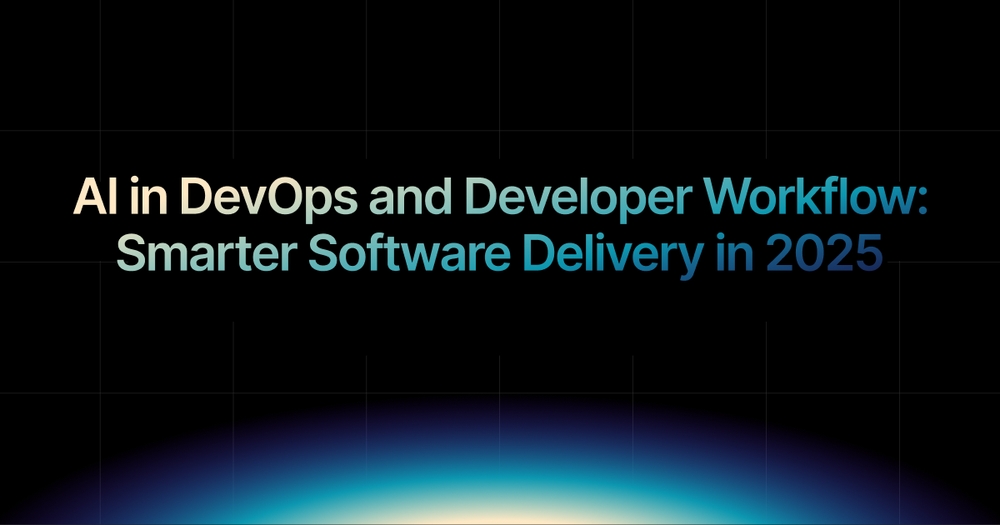
Introduction
Modern DevOps practices have improved the speed of software delivery, but teams still face complexity at every stage. Developers spend hours setting up CI/CD pipelines, fixing recurring build errors, and handling scaling issues. These manual steps take time away from writing code and improving applications. AI in DevOps addresses these challenges by automating repetitive tasks, analyzing logs to predict risks, and optimizing infrastructure in real time. This not only makes workflows faster but also more reliable. Platforms like Kuberns show how AI-driven automation can simplify deployment and scaling, giving developers a clear path to focus on building features instead of managing infrastructure.
What AI in DevOps Means
AI in DevOps applies machine learning and intelligent automation across the entire software lifecycle. From writing code to production deployment, AI reduces repetitive manual tasks and enables teams to make smarter, data-driven decisions. Instead of spending hours monitoring logs or debugging pipeline errors, developers gain real-time insights, automated fixes, and predictive recommendations. This leads to faster delivery cycles and fewer production issues.
Some of the most important areas where AI is transforming DevOps include:
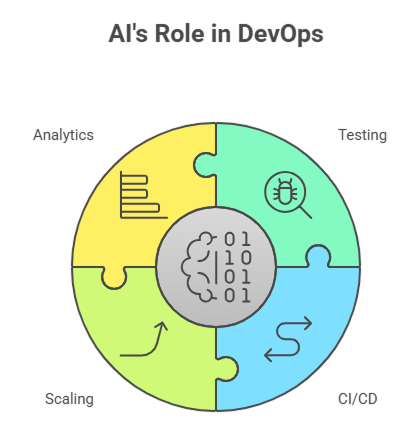
- Automated testing and QA : AI identifies bugs, code smells, and vulnerabilities early, reducing time spent on manual testing.
- Continuous Integration and Delivery (CI/CD) : AI-driven pipelines optimize build times, recommend configurations, and detect failure patterns before release.
- Infrastructure scaling and cost management : AI dynamically adjusts resources to match demand, ensuring performance while keeping costs under control.
- Error detection and predictive analytics : AI tools analyze logs and past incidents to predict potential failures and suggest preventive actions.
For a deeper breakdown of these use cases, see AI for DevOps: The Secret to Faster, Smarter Software Delivery.
AI in DevOps uses machine learning and automation to improve the entire software lifecycle. From writing code to deployment, AI reduces manual work and helps teams make data-driven decisions. Instead of monitoring logs for hours, developers get real-time insights and automated fixes.
Key areas AI impacts include:
- Automated testing and QA
- Continuous Integration and Delivery (CI/CD) pipelines
- Infrastructure scaling and cost management
How AI Improves Developer Workflow
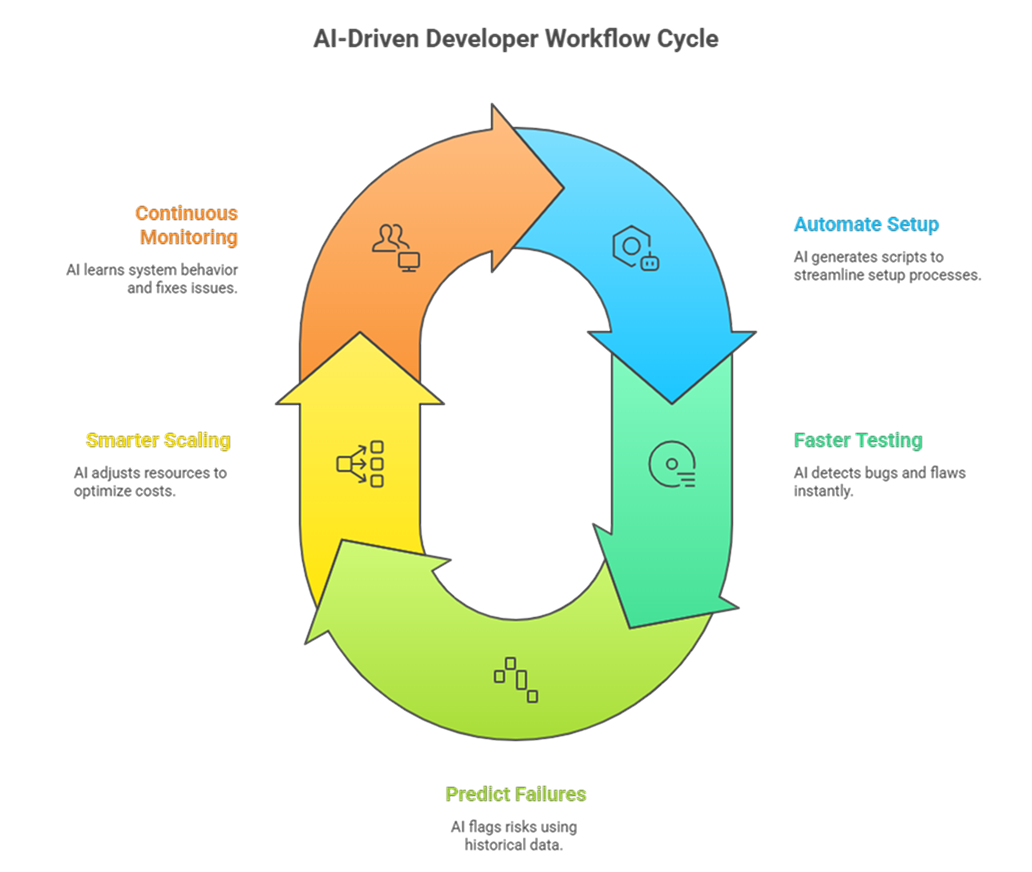
1. Automating Repetitive Setup
Manual setup in DevOps often involves writing long YAML files, configuring CI/CD pipelines, and maintaining environment variables. These steps are time-consuming and error-prone. AI-powered DevOps tools automate much of this by suggesting configurations and even generating deployment scripts. This removes repetitive work and helps developers start shipping features faster. Platforms like Kuberns go a step further by eliminating manual pipeline setup altogether, allowing one-click deployments directly from GitHub.
2. Faster Testing and Debugging
Traditional testing workflows require developers to wait for feedback after code is pushed. AI speeds this up by detecting code smells, security flaws, and dependency issues instantly. This leads to shorter testing cycles and fewer production failures. AI-driven testing is also adaptive, learning from past bugs to improve accuracy over time. For developers looking to streamline builds and testing, Kuberns CI/CD tools provide integrated pipelines with AI-enhanced error detection.
3. Predicting Failures Before Deployment
One of the biggest risks in DevOps is discovering issues only after deployment. Machine learning models solve this by analyzing historical incidents, logs, and metrics to predict possible failures in advance. This predictive layer adds safety to the release process, reducing downtime and rollbacks. Teams using platforms like Kuberns benefit from built-in AI checks that flag potential issues before going live.
4. Smarter Resource Allocation
Cloud costs often rise due to poor resource allocation. AI automatically adjusts CPU, memory, and storage in real time based on demand. This ensures stable performance during high traffic without overpaying for idle infrastructure. For example, Kuberns helps teams save up to 40% on AWS hosting.
5. Continuous Monitoring and Alerts
Monitoring applications manually is inefficient. AI systems analyze logs, metrics, and events to learn usage patterns. They trigger smart alerts when something unusual occurs and sometimes even apply automated fixes. This reduces incident response time and improves reliability. With Kuberns, developers get real-time AI monitoring and anomaly detection built into the platform, removing the need for separate tools.
Kuberns: AI-Powered DevOps Made Simple
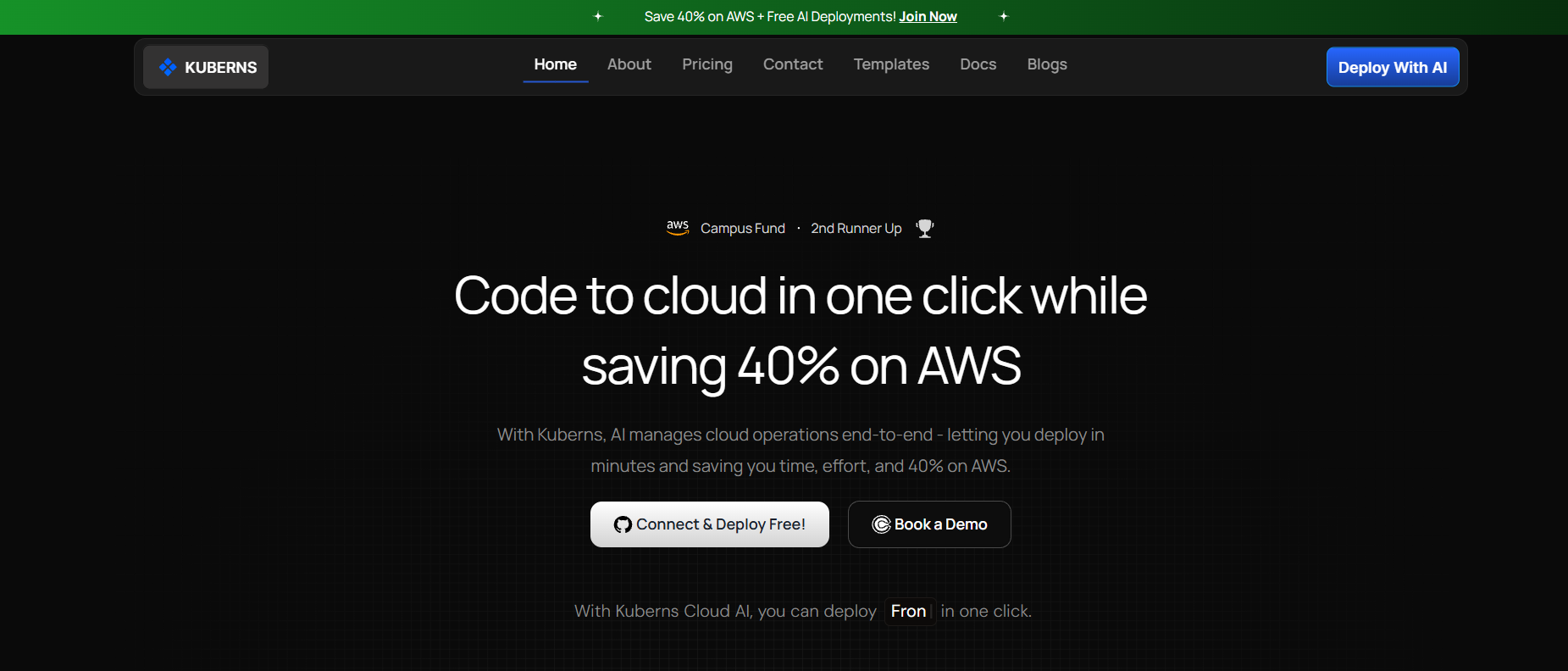 One of the clearest examples of AI in DevOps today is Kuberns. Instead of stitching together separate tools for CI/CD, monitoring, and scaling, Kuberns offers an all-in-one platform built on AWS with AI-driven automation.
One of the clearest examples of AI in DevOps today is Kuberns. Instead of stitching together separate tools for CI/CD, monitoring, and scaling, Kuberns offers an all-in-one platform built on AWS with AI-driven automation.
With Kuberns you get:
- One-click GitHub-based deployments : Connect your repository and deploy without writing YAML or complex configs.
- AI-managed scaling on AWS : The platform automatically adjusts resources and optimizes workloads, cutting AWS costs by up to 40%.
- Built-in CI/CD, logs, and monitoring : No need for third-party tools. The platform includes testing pipelines, live application logs, and system monitoring out of the box.
- Multiple environments and custom domains : Run staging, testing, and production environments side by side while managing domains from a single interface.
- Security and transparency by default : AI helps monitor vulnerabilities, control access, and enforce secure deployment practices.
This approach eliminates the complexity of managing different DevOps tools. Instead, developers focus on building applications while Kuberns handles deployment, scaling, and optimization automatically.
Why AI Matters for Teams of All Sizes
AI in DevOps is not limited to large enterprises. It creates value for small startups, mid-sized agencies, and global enterprises, each with different needs but similar challenges around time, cost, and reliability.
Startups
For early-stage teams, every hour counts. Developers should focus on product growth, not infrastructure setup.
- Skip manual pipeline setup and avoid writing complex YAML files.
- Deploy directly from GitHub with one click using Kuberns.
- Save time and keep the team lean without hiring a dedicated DevOps engineer.
Agencies
Agencies juggle multiple client projects and environments, often leading to higher cloud costs and operational overhead.
- Centralize all projects under one platform with AI-managed scaling.
- Cut AWS expenses by up to 40% while keeping client apps stable using Kuberns.
- Standardize deployments and deliver consistent results across clients.
Enterprises
Large organizations need reliability, compliance, and resilience at scale. AI-driven DevOps provides the foundation.
- Predict failures before deployment with automated risk analysis.
- Ensure uptime with AI-based monitoring and real-time scaling.
- With Kuberns, enterprises integrate CI/CD, logs, and monitoring into one platform instead of relying on fragmented toolchains.
AI is no longer experimental. It has matured into the standard way of running DevOps, helping every team type release faster, operate at lower costs, and reduce risk in production.
Best Practices to Adopt AI in Your DevOps Workflow
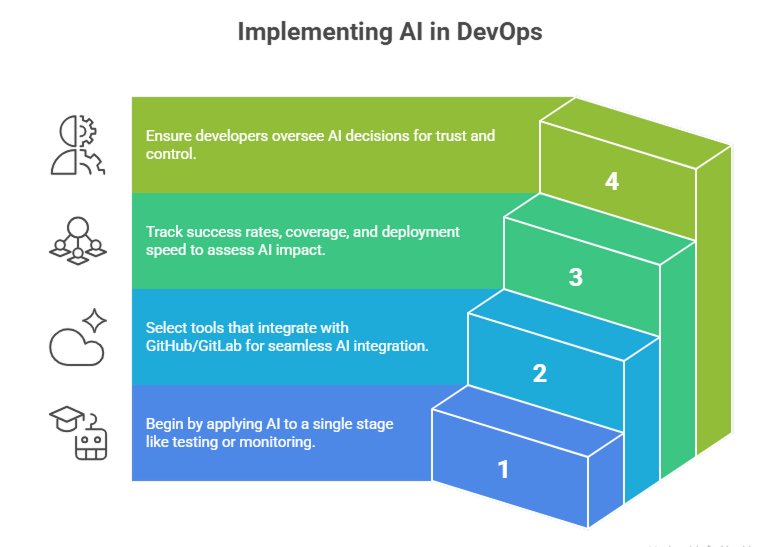 Adopting AI in DevOps is not about replacing your current workflow overnight. It works best when introduced in phases, with clear goals and developer oversight. These practices help teams gain value while keeping operations stable.
Adopting AI in DevOps is not about replacing your current workflow overnight. It works best when introduced in phases, with clear goals and developer oversight. These practices help teams gain value while keeping operations stable.
1. Start with one workflow stage Instead of applying AI everywhere at once, begin with a specific stage like testing or monitoring. For example, AI-driven testing tools can catch bugs early, while AI monitoring systems learn usage patterns to detect anomalies. This gradual adoption builds confidence without disrupting the entire pipeline.
2. Use AI-powered CI/CD platforms Choose platforms that integrate directly with GitHub or GitLab, so developers don’t need to maintain complex configurations. A platform like Kuberns provides built-in CI/CD pipelines, AI-driven scaling, and monitoring in one system, reducing the need for multiple tools.
3. Track metrics and validate AI decisions AI improves accuracy over time, but it still needs validation. Set up metrics such as build success rates, test coverage, and deployment frequency to measure improvements. Compare results before and after adopting AI features to ensure they add measurable value.
4. Keep developers in the loop AI should assist developers, not replace them. Developers need visibility into AI-driven actions like scaling decisions or predictive alerts. Maintaining human oversight builds trust and ensures accountability in case of unexpected issues.
Following these best practices helps teams adopt AI systematically, gain measurable improvements, and maintain reliability while modernizing their DevOps workflow.
Should You Move to AI-Powered DevOps?
If your team spends more time deploying than coding, it’s time to switch. Traditional pipelines mean managing separate CI/CD, monitoring, and scaling tools. AI removes that complexity and speeds up delivery.
With Kuberns, you get AI-driven deployments, built-in CI/CD, monitoring, and smart scaling in one platform. No extra tools, no manual setup.
Start focusing on code, not infrastructure. Get started with Kuberns today.

FAQs
What is AI in DevOps? AI in DevOps means using automation and machine learning to improve CI/CD, monitoring, testing, and scaling.
How does AI help developer workflow? It automates repetitive tasks, predicts failures, manages resources, and provides faster insights.
Which tools support AI in DevOps? Tools like Kuberns, GitHub Copilot CI, and AI-based monitoring platforms bring AI into deployment pipelines.
Is AI replacing developers in DevOps? No. AI assists by reducing manual work, but developers still guide decisions and ensure accountability.
What are the benefits of AI in DevOps? Faster releases, fewer errors, smarter scaling, lower costs, and improved monitoring accuracy.
How does AI improve CI/CD pipelines? AI suggests configurations, speeds up builds, detects failure patterns, and optimizes deployments.
Can AI reduce cloud costs? Yes. AI scales infrastructure in real time, preventing over-provisioning and cutting unused resource spend.
Is AI in DevOps suitable for small teams? Yes. Startups benefit by saving setup time and reducing the need for dedicated DevOps engineers.
What challenges come with AI in DevOps? High initial setup, data quality needs, and ensuring developers trust AI-driven decisions.
What is the future of AI in DevOps? AI will become standard for deployment pipelines, predictive monitoring, and resource optimization.